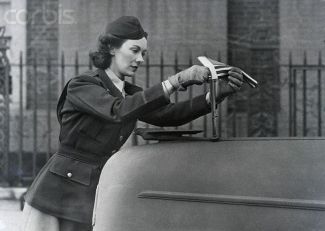By Kaleena Fraga
On June 5th, 1944 General Dwight D. Eisenhower sat down and wrote a letter. It was the night before he would attempt the largest seaborne invasion in human history, and Eisenhower’s mind had wandered toward the looming possibility of a battle lost on the beaches of Normandy.
The invasion had been months in the making. As the crucial time approached, the date itself kept changing. Bad weather forced Eisenhower to postpone the invasion, and he knew that he had only a three-day window in June to launch the attack before more inclement weather arrived. Eisenhower’s blood pressure shot up as he subsisted on a diet of coffee, cigarettes, and nerves.
On the day before the invasion, Ike sat down and thought about what would happen if the invasion failed. He wrote:
“Our landings in the Cherbourg-Havre area have failed to gain a satisfactory foothold and I have withdrawn the troops. My decision to attack at this time and place was based upon the best information available. The troops, the air and the Navy did all that Bravery and devotion to duty could do. If any blame or fault attaches to the attempt it is mine alone.”
Eisenhower then tucked the note in his pocket. He apparently had the habit of writing such “in case of failure” notes before invasions, and tearing at least one up afterwards. It was, as Jean Edward Smith noted in his Eisenhower biography Eisenhower in War and Peace, reminiscent of the same note that Lincoln wrote expecting to be defeated in the election of 1864.
“It seems exceedingly probably that this Administration will not be re-elected. Then it will be my duty to cooperate with the President-Elect to save the Union between the election and the inauguration; as he will have secured his election on such ground that he cannot possibly save it afterward.”
Yet with the first note weighing heavily in Eisenhower’s pocket, he penned another, a speech, which he gave to his troops on the eve of the attack. To his troops he said, “The eyes of the world are upon you. The hope and prayers of liberty-loving people everywhere march with you. I have full confidence in your courage, devotion to duty and skill in battle. We will accept nothing less than full Victory!”
 On the night before the invasion Ike waited with his personal chauffeur (and rumored mistress) Kay Summersby, who noted that the General’s “eyes were bloodshot, and he was so tired that his hands shook when he lit a cigarette.” Still, she wrote, “if Ike had wished, he could have been [with] Churchill…[and] de Gaulle…who were gathered just a few miles away in Portsmouth. But he preferred to wait in solitude.”
On the night before the invasion Ike waited with his personal chauffeur (and rumored mistress) Kay Summersby, who noted that the General’s “eyes were bloodshot, and he was so tired that his hands shook when he lit a cigarette.” Still, she wrote, “if Ike had wished, he could have been [with] Churchill…[and] de Gaulle…who were gathered just a few miles away in Portsmouth. But he preferred to wait in solitude.”
The invasion, although a success, cost thousands of lives. When Eisenhower found the note again he showed it to his aide, Captain Harry. C Butcher, who asked to keep it. Eisenhower, reluctant, acquiesced.
In the end, Eisenhower and Lincoln embraced a strategy of warfare perhaps best articulated by another American president, John F. Kennedy:
“Victory has a thousand fathers, but defeat is an orphan.”

Fascinating little-known details; I recently just re-watched The Longest Day; amazing story and amazing film; the loss of life was staggering.
LikeLiked by 1 person